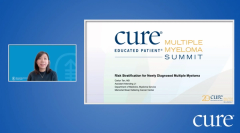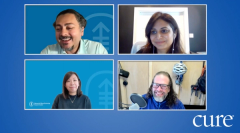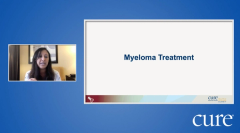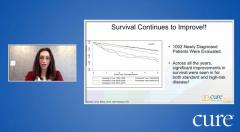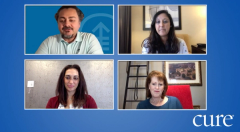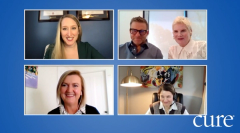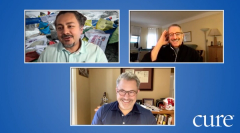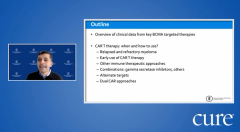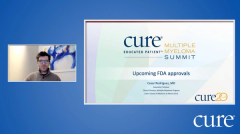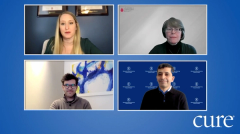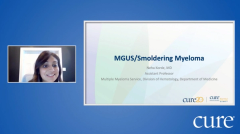
Educated Patient® Multiple Myeloma Summit New Therapies on the Horizon Panel: March 12, 2022
Watch Kristie L. Kahl, with Sham Mailankody, MBBS; Cesar Rodriguez, MD; and Lynn Steele, discuss new therapies on the horizon, during the CURE Educated Patient Multiple Myeloma Summit.
This panel featured Kristie L. Kahl, with Sham Mailankody, MBBS; Cesar Rodriguez, MD; and Lynn Steele.
Kahl: So, Dr. Mailankody, I'm actually going to start with you and then also ask Lynn a question. So someone asked if Medicare is covering the cost of CAR-T (cell therapy), and then Lynn, as a follow up, if you could discuss the financial toxicity because I know this treatment can be expensive, so maybe resources that are available for our patients to help pay for this type of therapy?
Mailankody: Thanks, that's a very important question. So Medicare does cover FDA-approved CAR-T treatments for myeloma as well as for other cancers where there is an FDA approved product, that has been approved based strictly on the labeled indication, which is for patients with four or more lines of treatments currently. So they do require that we follow the labels as closely as possible. But in that scenario, Medicare would cover the cost of CAR-T cells. Private insurances sometimes have a longer process of approval, etc. So starting this discussion sooner with the providers and hospitals, starting this discussion earlier with the providers would be important to ensure timely access, but those insurance companies are providing coverage for these treatments.
Steele: Yes, so through the Leukemia and Lymphoma Society, we do have several financial assistance programs that are available, including copay assistance. We do have travel assistance available also. And then there's a few others that you know, we certainly encourage people to reach out to us here at the Leukemia and Lymphoma Society to discuss their financial concerns. We can also connect them to other helpful organizations as well. So there may be other financial resources that we are aware of that we can also refer them to.
Kahl: Dr. Rodriguez, we had someone ask if you could discuss the duration of response and the progression-free survival that we're seeing with iberdomide?
Rodriguez: So the duration of response at the moment was still have some, we still are waiting for more data to come out. But the duration of the response is definitely very promising, more than eight months at the moment. And in terms of progression-free survival, it's more than a year. So we are definitely seeing a better benefit than with the current (immunomodulary drugs). And the nice thing about the cell mods is that this drug in particular tends to be more potent than the current (immunomodulary drugs). And that's why they're classified as a different category of our cell mode, or the next generation of the cell much similar to what the thalidomide was initially and now we have to learn.
Kahl: Dr. Mailankody, is it possible to replace CAR-T cell therapy with bi-specific therapy or monoclonal antibody therapy?
Mailankody: So a great question. I think it's a question that we are trying to ask and answer as well. I would say the bi-specific antibodies look very promising. I think you saw some of the data that Dr. Rodriguez presented, high responses and pretty impressive progression-free survival and duration of responses as well with acceptable toxicity profiles.
I think we are going to start to ask this question more and more as more products become available. One is, you know, could you do bi-specific antibodies instead of CAR-T cells or after CAR-T cells as a sequential treatment? So if patients have had a previous CAR-T cell therapy with BCMA and then unfortunately eventually progress, can they then get a bi-specific antibody that targets BCMA, for instance? And we do have some patients anecdotally have gone from one trial to the other and have had responses with more than one BCMA-directed therapy. Some of this will boil down to availability of CAR-T cells as I think patients and doctors are familiar, although the cell was about a year back, we are having challenges providing it to our patients just given availability. Bi-specifics perhaps won't have the same challenges with availability. So that's one factor. Many of the bi-specifics all the early treatments are intensive or need admission eventually can be all outpatient could be done in the community doesn't need special and may not need specialized centers as much as a CAR-T cell does. So there's other logistic considerations as well, I think.
Kahl: Dr. Rodriguez, I know you had mentioned a few different drugs that are going to be approved, hopefully in the next year or two, we had a question come in. We have a half dozen of these coming in, hopefully. But should we be doing single clinical trials to compare them against each other, and pick the top two? Or what's the benefit of having all of these get approved versus, you know, maybe just picking the top ones?
Rodriguez: That's actually a very good question. So we have many BCMA-directed therapies. And obviously, all the drug companies are kind of wanting to play in the field and are going to want to have their drug. And it could be a little bit overwhelming, because we're going to have many options. And like right now we have two CAR-Ts that are FDA approved. So which one do we choose? …And fortunately, right now, since the slots for each party is very limited, we'll choose whichever is available. But once we have availability or follow them, it will be a little bit trickier in terms of to which one to choose, in terms of targeting different protein receptors. I think that it's very good to have all of these options because you can make them either sequential or studying combination like Dr. Mailankody is trying to do with the GPRC and BCMA. But I wouldn't say that it's a bad thing to have too many BCMA therapies. At the moment, I think with time, we will start to see more data mature and be able to have a better idea of how one might be different than another. I don't think we will ever have a study that's going to compare all of the BCMAs next to each other, but we will have real world data once these are approved and be able to say okay, in true myeloma patients, which ones are we seeing that are safe for are having better responses and better tolerated? Maybe that's going to help weed out the winners and the losers.
Kahl: Both physicians have presented a lot of exciting information, and it's a lot coming down the pike. So Lynn, can you discuss the resources that the LLS has available to help our patients better understand these newer drugs coming their way?
Steele: I certainly am happy to do that. And so happy to be here with all of you today. We have many resources, so educational materials that patients can order booklets and things like that. They can also access our information online, if they have that availability. I don't know if you want me to talk about some of the other personalized support. But you know, we can certainly provide them when they call in to the Information Resource Center, we meet them where they are, talk to them about what's happening. We heard so many inspiring things today and different things from all of the speakers and, and the physicians, so much happening in this world of myeloma. But we're here to really provide other resources like our support resources, which could be the online chats and getting connected with other myeloma patients or other caregivers, we have our LLS community. And that is also a place for patients to go. It's more like a message board. Caregivers can also log on there. And then we have our peer mentors and peer-to-peer support, which we've heard from others today. It's so important, isn't it just to get connected with others who maybe aren't walking in the same exact journey, but certainly, you know, getting connected to someone who has been there and done that or been there and doing that. And then support groups. So we do have virtual support groups in our regions throughout the US here. And that gets people connected with their LLS region. And those programs that are available, education programs and podcasts and webcasts. So really, we have lots of information and things to offer to patients, caregivers, family, friends.
Kahl: Dr. Mailankody, we have a question. Do you see toxicity profiles between the CAR-T cell therapy and the BiTE therapy? Does that vary with comorbidities? So for example, like if somebody has a cardiac problems or diabetes?
Mailankody: Yeah. So, I think it's probably fair to say that more comorbidities it may become more challenging to manage these toxicities. I don't know that the frequency at which these toxicities occur is influenced by comorbidities. But certainly, if you have somebody with preexisting cardiac or kidney or other issues, those patients may have a harder time dealing with CRS where there's a lot of fluctuation blood pressure, oxygen levels, so there may be more affected and doctors that treat those patients might be more sensitive to earlier intervention. The good news is we do have treatments for these different toxicities now, many more than we did five or 10 years back. So they are treatable conditions. So I think having a heightened sensitivity to these toxicities, early intervention, good supportive care, and good nursing care, good ICU level care if necessary, are all critical factors in administering these treatments quite safely, and again, with the BiTEs, it's primarily the first two or three doses where we see these side effects. And in most of these products beyond that, while there are other challenges, CRS and neurologic toxicity tend not to be as much of an issue. So if we can support our patients with the first few weeks of these treatments, typically, then they would do quite well as an outpatient. So I would not think that comorbidity should preclude patients from getting these treatments, but just have a more higher degree of sensitivity to managing those toxicities.
Kahl: Dr. Rodriguez, what line of therapy do you think the iberdomide will be approved for? Will it only be used in relapsed/refractory, can we use it upfront?
Rodriguez: I think it's eventually going to be moved more upfront. But at the moment, it's intended for relapsed/refractory based on how this study was designed. So currently, this study was designed for people who already had prior lines of therapy, the median prior lines of therapy was six, so very heavily pretreated. So if it does get up to your approval is going to be for triple-refractory, there will be more studies moving this agent more upfront, for one to three prior lines of therapy, and maybe it'll start to move earlier in treatment. But for now, it will very likely be approved for more than three lines of therapy.
Kahl: So earlier, we actually had a panel discussion on treating myeloma long term and one of the points that was brought up was trying to treat with your best option upfront now, don't save the better options for later lines of therapy. So we did have a patient ask: If that's the case, and we want to put the best treatments up front, why haven't we moved CAR-T to the frontline yet?
Mailankody: Yeah, good question. I think it is moving to the frontline. There are trials of both ida-cel and cilta-cel in patients, some of them at very advanced stages of completion, one to three prior lines. We also have trials of both of these CAR-T cells in patients with high-risk myeloma, say for instance, deletion 17 or another high-risk factor in the frontline setting. We have trials looking at combining it with transplant or post-transplant in lieu of transplant. So I think yes, if this promise holds, as we hope it does, in the next two to three years, we will start seeing these data come along, which will make it so that these CAR-T cells and potentially the bi-specific antibodies will be used much sooner than where it's currently being approved or will be approved shortly. So yes, I definitely would see that happening in the next two to three years, and filed at least based on the data hopefully also in practice.
Rodriguez: So just for the audience to kind of give an explanation as to why it's being approved for more than four lines of therapy. Anytime there's a new drug that's being tested, it has to first be made sure that it's safe in humans, that it's safe in patients and it's normally started and studies and people who have no other options left and see if this works. And if it does prove to work and then the FDA approves that. Then you start looking into earlier in therapy, and like Dr. Mailankody saying there are ongoing studies of both CAR-T and bi-specifics up front in one to three prior lines of therapy, or even in people up front right up right off the bat and people who are high-risk disease are not responding to initial therapy. So only a few years we'll see.
Raw transcriptions have been lightly edited for clarity.
For more news on cancer updates, research and education, don’t forget to

